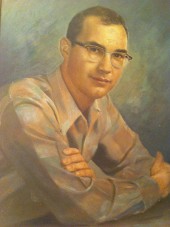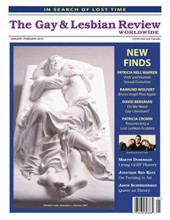Dear Richard Schneider:
From the start to end, this issue is great.
I agree that our being hidden in the past is important in learning our history. Larry Kramer’s article in a previous issue, opposing queer theory, is a great example of how a “view” can bring on a counter view and a great discussion. Ironically I don’t agree with the queer theory people yet do agree with the disagreement with Kramer.
It is good to have a person who served in the military again say that the majority of people serving don’t feel the need for don’t ask, don’t tell. And as we try to be “accepted” it is good to point out that laws with good purposes, such as the obscenity laws, can have bad enforcement and do more harm than good.
There are good letters to the editor, and again Kramer inspired response. I think the issue of how black Americans view homosexuality is not that confusing — they use the Bible that approved of slavery — not that only black people have been slaves, just as the Mormons preach old-fashioned marriage while they had polygamy at their founding and only “got rid of it” when forced to by the government.
And Bill Percy’s protest of using science as a replacement for religion as “proof” of something when in many cases it has merely been pushing religious ideas under different terms is still needed, since many young people have no idea of how science, medicine, etc. were used to harm our community in the past. A columnist, Thomas Sowell, has recently said we should not accept “science” when it tells us about climate control, but he accepts it when it says homosexuality is wrong, if it says homosexuals are sick.
As to the question of the Knights of the Clock, the early Los Angeles interracial group, I know of no more information, as W. Dorr Legg covered it in ONE’s first book, Homosexuals Today, still available as I have a copy, and assume ONE Institute (Dorr Legg and Jim Kepner’s half of ONE, Inc.) and the Homosexual Information Center (Don Slater’s part of ONE) archives/collections do as well.
I am sorry that I see no place, especially in “queer studies,” that the issues brought up in BTW are covered. I have said that is where even our HIC Web site fails, as do all books, in covering why ONE and HIC founders had such important views that are still valid today.
You point out that in a court (in Australia) men were asked to “prove” they were homosexual. We answered that question, even if the world and even “gays” reject it, years ago, in court, with the person best able to support our belief, Dr. Evelyn Hooker. In fighting drafting of young men who had said they were homosexual to avoid the draft, and some of them were not homosexual, Don Slater and attorneys went into court several times, winning all cases, and telling the court that the only proof that someone is homosexual is their word. An act does not prove or make someone homosexual, and no “experts” could prove it when Hooker offered them the chance.
And then you say Kenya wants homosexuals there to identify themselves, so they will know how many there are in dealing with AIDS. Well, that is the same issue we faced in the 1960s when the Health authorities in Los Angeles asked ONE to work with them, take money, and deal with homosexuals with medical problems. We said no and reminded them that in doing so, we would have to identify those people, and by their admission they would be confessing to a crime and the information would not be kept secret. They claimed we were wrong until we showed them that information given in secrecy to them had been given by them to health agencies in another state.
And the silly addition of letters to our “community” only shows how silly some of us are. Just as the continued insistence by a few people that only the word gay is acceptable — even some women don’t accept the word lesbian. No comment on how Texas should correct the mistake in its attempt to defend marriage from us. They now have a “gay” mayor in Houston. I think that tells us where the future lies.
But the most fun is in trying to understand what Jason Schneiderman is trying to say, in “In Defense of Queer Theory,” about Larry Kramer’s anti-queer theory remarks. How can I say it except that his “proof” is unacceptable to me, yet his arguments are right?
No one at ONE, as far as I can remember, ever accepted the arguments about Foucault. I never read him, and it seems to me that much of the article is an East Coast view as we were busy working on the West Coast and not being “intellectual.”
It amazes to me that the world still seems to think homosexuality and our movement didn’t happen until the East Coast thought to join us.
And in book reviews, it seems no one ever heard of many west-coast authors, including Patricia Nell Warren, who is in this issue, or Joseph Hansen, etc.



